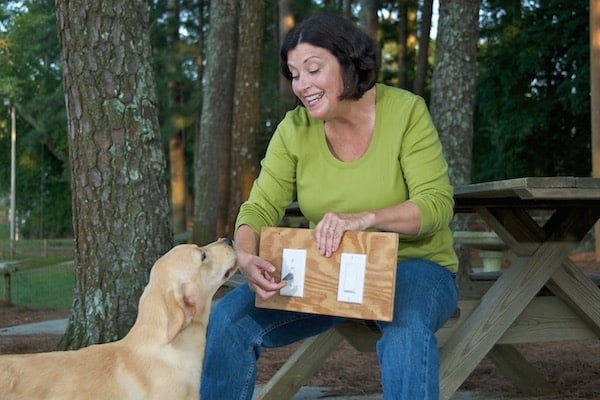Editor’s note: Jennifer Arnold’s new book, Love Is All You Need: The Revolutionary Bond-Based Approach to Educating Your Dog, introduces the concept of social learning for dogs through bond-building exercises. We asked Jennifer to talk about her inspiration for this new training approach.
The power of the human-dog bond astonishes me. Today, I watched a dog transform the entire family of a special needs child. One middle-sized, mixed-breed dog infused this weary family with such joy and laughter they were very nearly unrecognizable to their pre-dog selves. I love seeing this transformation. That’s a good thing since it’s my job to facilitate the bond between service dogs and people who have physical disabilities. My passion, however, goes beyond my professional responsibilities. Having seen what can happen when the bond between people and dogs is strong, I find myself wanting everyone who lives with a dog – and every dog – to have that same experience.

Twenty-five years ago, I founded Canine Assistants, a service dog school, on a farm just north of Atlanta. I was committed to making life better for people with special needs. As a teenager, I was diagnosed with an autoimmune disease that caused me to use a wheelchair for two and a half years; I had personal experience with the issues these people were dealing with. I could empathize. But what I didn’t have back then was any actual experience working with dogs.
Back then, I studied with an old-fashioned, because-I-said-so trainer who taught me how to execute a proper leash correction and other ways of forcing dogs to obey. It wasn’t a very pleasant process… and frankly it didn’t work particularly well. Yes, our dogs could respond to commands when they graduated, but it often took them a year to a year and a half to begin working well their new recipient partners.
Not long after, I embraced the idea of using positive reinforcement, and, boy, it was a relief. Yet, while positive reinforcement certainly felt more comfortable, it still took a year to a year and a half for the dogs we placed to begin functioning harmoniously with their human partners. The coincidence struck me — it took 12 to 18 months for our clients to give up the directive we’d taught and simply start treating their dogs less like machines and more like friends.
Why did abandoning training actually make people and dogs better, happier teammates? Research conducted on dogs over the past 25 verified what we were experiencing in practice: Obedience training simply isn’t good for the human-dog relationship. It doesn’t matter what technique is used to mandate compliance; the process itself is adversarial. Whether through punishment or reward, dog training pits person against dog, creating anxiety in both without giving either what is truly wanted or needed.

Jennifer Arnold with one of the service dogs in training at Canine Assistants. (Photo courtesy Jennifer Arnold)
Dogs aren’t our adversaries. They are our helpmates, our protectors, our confidantes, our children who never grow up. Above all, they are our friends. We do not need their obedience; we need their cooperation. That cooperation comes, not from training, but rather from a strong relationship. Dogs, as social animals, need secure social connections, and they are willing to form those connections with us.
I think of these groups as blended-species families. Like all social animals, dogs want to fit in with, please, and even emulate those in their social group. Clearly, education is a significant part of what social animals provide one another, particularly when one member – in this case our dogs – must function within a society not well known to them… the human one.
It’s a little like having a young, foreign exchange student in your home. When the student trusts you and feels safe under your tutelage, he will naturally take his cues from you. It’s up to you to make known what is culturally acceptable, to act as a role model, mentor, and guardian, seeking not to control what the young student does but rather to give him the tools and the guidance to appropriately control his own behavior. In this process, how you make him feel is far more important that what you make him do, since how he feels controls what he does. It works the same way with our dogs.
This revolutionary, science-based philosophy, which we’ve named the Bond-Based Approach®, is now in practice with the dogs at Canine Assistants. We’re also spreading this good news to family dogs. Bond-Based Choice Teaching® gives dogs the knowledge and skills they need to behave appropriately, and the dogs, secure in the knowledge they are adored, do the rest. The resulting bonds are transformative for people and dogs. As it turns out, what makes the human-dog relationship work isn’t obedience, it’s love.
About the author: Jennifer Arnold is the founder and executive director of Canine Assistants, a service-dog school based in Milton, Georgia, and the creator of the Bond-Based Choice Teaching® approach to interspecies relationships. She is the author of the New York Times bestseller Through a Dog’s Eyes, which was also the subject of a PBS documentary, In a Dog’s Heart. She lives with her husband, veterinarian Kent Bruner; son Chase; four dogs; two cats; and a number of other animals.
The post Commentary: Why Obedience Training Isn’t Good for the Human-Dog Relationship appeared first on Dogster.
No comments:
Post a Comment